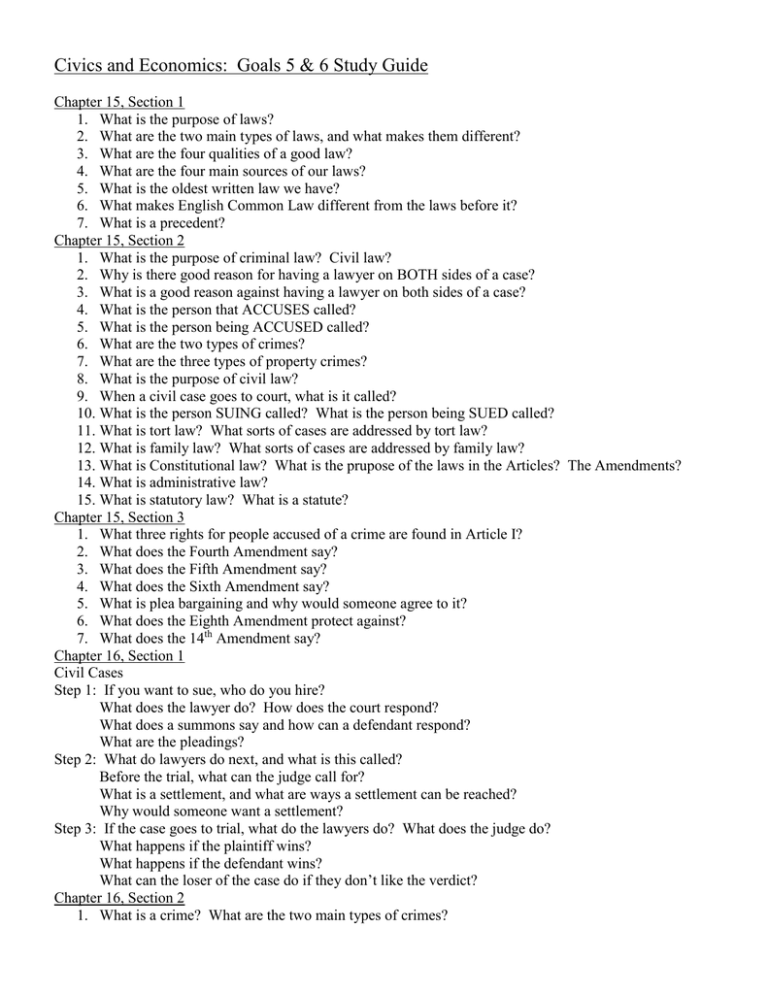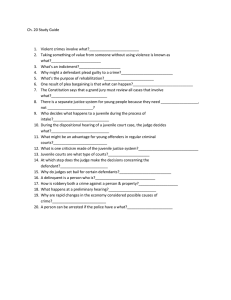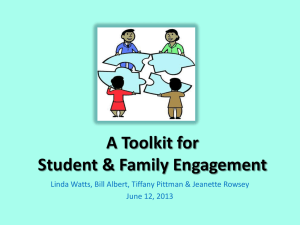Civics and Economics: Goals 5 & 6 Study Guide
advertisement

Civics and Economics: Goals 5 & 6 Study Guide Chapter 15, Section 1 1. What is the purpose of laws? 2. What are the two main types of laws, and what makes them different? 3. What are the four qualities of a good law? 4. What are the four main sources of our laws? 5. What is the oldest written law we have? 6. What makes English Common Law different from the laws before it? 7. What is a precedent? Chapter 15, Section 2 1. What is the purpose of criminal law? Civil law? 2. Why is there good reason for having a lawyer on BOTH sides of a case? 3. What is a good reason against having a lawyer on both sides of a case? 4. What is the person that ACCUSES called? 5. What is the person being ACCUSED called? 6. What are the two types of crimes? 7. What are the three types of property crimes? 8. What is the purpose of civil law? 9. When a civil case goes to court, what is it called? 10. What is the person SUING called? What is the person being SUED called? 11. What is tort law? What sorts of cases are addressed by tort law? 12. What is family law? What sorts of cases are addressed by family law? 13. What is Constitutional law? What is the prupose of the laws in the Articles? The Amendments? 14. What is administrative law? 15. What is statutory law? What is a statute? Chapter 15, Section 3 1. What three rights for people accused of a crime are found in Article I? 2. What does the Fourth Amendment say? 3. What does the Fifth Amendment say? 4. What does the Sixth Amendment say? 5. What is plea bargaining and why would someone agree to it? 6. What does the Eighth Amendment protect against? 7. What does the 14th Amendment say? Chapter 16, Section 1 Civil Cases Step 1: If you want to sue, who do you hire? What does the lawyer do? How does the court respond? What does a summons say and how can a defendant respond? What are the pleadings? Step 2: What do lawyers do next, and what is this called? Before the trial, what can the judge call for? What is a settlement, and what are ways a settlement can be reached? Why would someone want a settlement? Step 3: If the case goes to trial, what do the lawyers do? What does the judge do? What happens if the plaintiff wins? What happens if the defendant wins? What can the loser of the case do if they don’t like the verdict? Chapter 16, Section 2 1. What is a crime? What are the two main types of crimes? 2. What is a victimless crime? 3. What are the four main functions of crime penalties? a. b. c. d. 4. How can people be rehabilitated? 5. What is a sentence? Name some examples of sentences. Steps in a Criminal Case Step 1: What are the three reasons for which someone can be arrested? What do police do when they arrest someone? Why? What happens when the person is brought to court? Why? What three things can the judge decide to do with the person? Step 2: What is the next court visit called, and what happens there? What is an indictment? What are the three possible pleas you could enter? Step 3: What happens if you plea “not guilty”? What two things does someone have a right to in a criminal case? What do the lawyers do before the trial? Step 4: Who do lawyers question, and what do you call the answers given? What is cross-examination? Who gives the verdict, and what are the three possible outcomes? What is a hung jury, and what must happen if there is one? If the defendant doesn’t like the verdict, what can he do? If the prosecution does like the verdict, what can they do? Why? Chapter 16, Section 3 1. What is a juvenile? 2. What are some causes for juvenile delinquency? Is this true for everyone? 3. What is the primary purpose of the juvenile justice system? 4. What two things can start a juvenile case? 5. What are the two types of juvenile cases? 6. What two options does a juvenile judge have in a case? 7. How is juvenile court different from adult court? 8. What are some options for sentencing if a juvenile is found to be a delinquent? 9. What happens if the juvenile is found to be neglected? Chapter 17, Section 1 1. How does the Internet encourage civic participation? 2. What are two reasons why it’s important to evaluate information you find on the Internet? 3. What four kinds of activities may citizens perform at government Websites? 4. What is a newsgroup? 5. What is the goal of political party Websites? 6. How do political analysts use the Internet? 7. What are reasons that major parties should worry about grassroots Websites?


